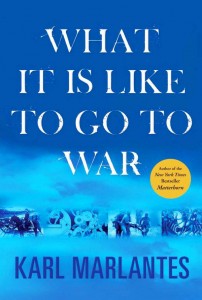Karl Marlantes: Cold Victory, a Novel
June 21, 2024 by David
Filed under Fiction, WritersCast
 Cold Victory: A Novel — Karl Marlantes — Atlantic Monthly Press – 978-0-8021-6142-0 – Hardcover — 352 pages — $28.00 — January 9, 2024 — ebook versions available at lower prices
Cold Victory: A Novel — Karl Marlantes — Atlantic Monthly Press – 978-0-8021-6142-0 – Hardcover — 352 pages — $28.00 — January 9, 2024 — ebook versions available at lower prices
I have to confess at the outset that Karl Marlantes has become one of my favorite authors of recent times and his latest book Cold Victory, is yet another outstanding novel from this author, whose first novel, Matterhorn, was published in 2010 after a full thirty years of effort. I’ve had the pleasure and privilege of interviewing Karl for all three of his previous books, each of them very different in subject matter and approach. A characteristic that is common to all of this author’s books is his extraordinary ability to create believable, wonderful characters that truly come to life on the page.
Cold Victory is related Karl’s 2019 novel Deep River, through a single common character. Deep River is set in the Northwestern United States in the early twentieth century, while this new book takes place in Finland right after the close of World War II. It’s safe to guess that most readers, like me, will be unaware of Finland’s complex role in that war, allying first with Germany to fight the Soviet Union to keep the latter from taking over its much smaller neighbor, and then allied itself with the Allies to fight Germany. Basically, Finland fought anyone and everyone to maintain its independence. In the aftermath of WWII, Finland was forced to pay reparations to the Soviets and gave up 10% of its land to the USSR.
In Cold Victory, the main characters are American and Russian, but the countries and the people of Finland have equal importance to the story. The American and Russian protagonists are two couples of similar age, but with such different life experiences that they must relate to each other on what they do share — honor, and love of soldiering for the men, commitment to their children and friendship for the women.
In the early parts of the novel, Marlantes sets the scene – his knowledge and appreciation for Finland, its culture and history, is palpable, and he uses his extensive knowledge to build a solid background for what develops into a riveting story that is sometimes extremely uplifting and often painful, as the tragedy at the center of the book unfolds. Marlantes’ story telling is vivid and powerful, the energy of his words always pulling us forward.
And I have to note that Karl has mastered his material – the descriptions of cross country skiing through bitter cold Finland are brilliantly portrayed. Be prepared to feel the cold in your soul.
This is another terrific novel from an outstanding writer whose skills are constantly evolving. And Karl is always a pleasure to speak with. Please enjoy our conversation and I hope you will pick up this book.
“For the history lesson alone, Cold Victory is memorable.”—Mark Steve’s, NY Journal of Books
Karl Marlantes graduated from Yale University and then was a Rhodes Scholar at Oxford University, before serving as a Marine in Vietnam, where he was awarded the Navy Cross, the Bronze Star, two Navy Commendation Medals for valor, two Purple Hearts, and ten air medals. He lives in Washington State.
Interview about Deep River
Interview about Matterhorn
Interview about What It Is Like to Go to War
Podcast: Play in new window | Download
Karl Marlantes: What It Is Like to Go to War
October 2, 2011 by David
Filed under Non-Fiction, WritersCast
 978-0802119926 – Atlantic Monthly Press – Hardcover – $25.00 (e-book and audiobook editions available)
978-0802119926 – Atlantic Monthly Press – Hardcover – $25.00 (e-book and audiobook editions available)
I read Karl Marlantes’ novel, the extraordinary Matterhorn last year (and interviewed him about it for Writerscast – you can listen to that interview here). I don’t think I am alone in believing that Matterhorn is perhaps the finest and most important war novel of the Vietnam generation; for me at least, it belongs in the pantheon of great American war novels (going back to WWI, Thomas Boyd’s Through the Wheat is another great novel written by an former Marine).
It took Karl Marlantes more than 30 years to write and publish the novel we read as Matterhorn its final form. His new book, What It Is like to Go to War, now follows as a deeply thoughtful and moving work of nonfiction about the nature and meaning of war, and what it means to the individual warriors who participate who fight, as well as to the society that gives them that responsibility.
There are many parallels between the two books. I’d recommend you take on the novel first, spend some time thinking about its story and characters, and then move on to this new work of nonfiction, which is a combination of personal memoir, meditation and social, political and cultural analysis and polemic.
Insofar as fiction gives us our deepest emotional and spiritual truths, Matterhorn cannot fail to move you and allow you to feel the reality of what it is like when our best and brightest go to war. Then What It Is Like to Go to War gives us another carefully wrought perspective, what Marlantes has learned from his own experiences and from many years of studying and thinking about war and society.
And we should all be paying attention to what he says here. America has had more people fighting wars for a longer period of time than at any other time in our history. Indeed what does this say about contemporary American society?
In 1969, when he was just 23, Karl Marlantes was an inexperienced lieutenant in charge of a platoon of Marines whose lives were in his hands. His experiences in the jungles of Vietnam , molded and shaped him throughout his life. He has thought deeply about his wartime experiences, how they affected him and his comrades, as well as how other soldiers before and since have gone through similar experiences. In What It Is Like to Go to War, Marlantes weaves accounts of his own combat experiences with analysis, self-examination, and powerful ideas drawn from his wide reading from Homer to the Mahabharata to Jung.
Unlike many of us who feel that war must be ended in modern society, Marlantes starts from the belief that war is an inevitable component of societal and political being. What he is after is to make us think about preparing warriors not for fighting, which we already do quite well, but for living with the effects on those who go to war that derive from participating in the morally unnatural but societally sanctioned acts of killing other human beings.
Most societies that preceded us have used powerful rituals, myths and ceremonies to integrate acts of war into the fabric of their cultures, and to reintegrate their warriors thoroughly into their societies, while our secular, materialist society really offers no tools or methods to warriors (or for that matter to civilians) to create a holistic “story” of why and how war is meaningful and necessary.
One of the many points he made in this book really struck me is that those who send men and women to war are themselves warriors, that actual soldiers (as opposed to guns and bombs) are their weapons. These individuals must fully comprehend what they do, and must find ways to integrate their own acts of war as much as the soldiers on the battlefield who wield the weapons and who witness so much death and destruction on both sides of battle.
I found that the author’s afterword to the book was very important to my understanding and acceptance of his work:
“We must be honest and open about both sides of war. The more aware we are of war’s costs, not just in death and dollars, but also in shattered minds, souls, and families, the less likely we will be to waste our most precious asset and our best weapon: our young.”
“The substitutes for war…are spirituality, love, art, and creativity, all achievable through individual hard work.”
I can’t recommend this book to readers enough. It’s book that, like the work of my friend, Paul Chappell, (Will War Ever End and The End of War) has the potential to shift our societal dialogue about war and what it can and should mean to a modern society.
There’s a fine review of What It Means to Go to War in the NY Times and a very worthwhile interview with Karl on Livewriters about Matterhorn.
Podcast: Play in new window | Download

